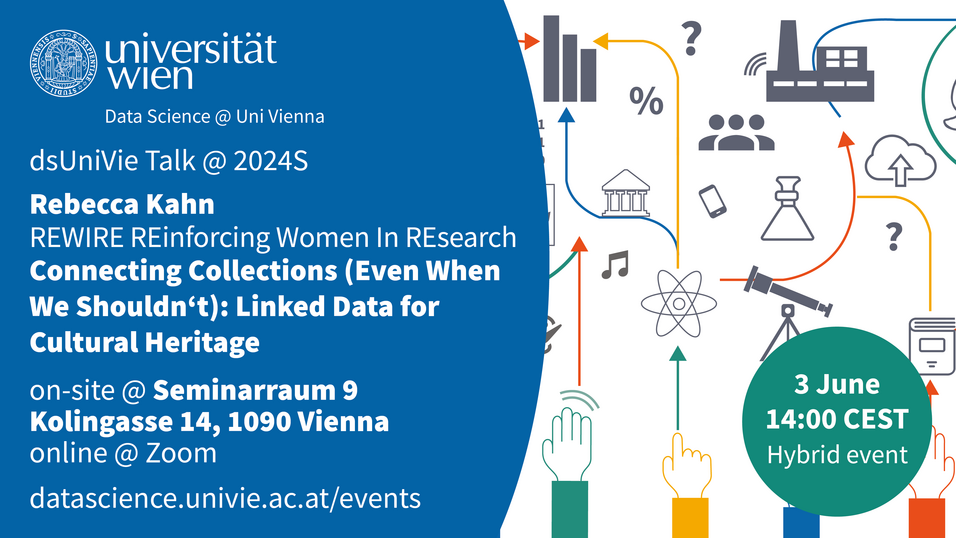Monday, 3 June 2024 @ 14:00–15:00 CET
On-site:
University of Vienna
Seminarraum 9 (OG01)
Kolingasse 14–16
1090 Vienna
Online:
Zoom-Link: https://univienna.zoom.us/j/68154688415?pwd=anBCaXlnZ0ZRZ0R2YkV0U2hMSXdIQT09
Meeting-ID: 681 5468 8415
Passcode: 517043
Connecting Collections (Even When We Shouldn’t): Linked Data for Cultural Heritage
Abstract :
Every day, more and more cultural heritage data comes online. An ever growing proportion of museum, archive and library materials are now available and are often aggregated into large-scale digital research infrastructures. These allow users to overcome many of the logistical challenges of using multiple sources, such as the fragmentation and geographic dispersal of collections. At the same time, researchers using this data have to grapple with a deluge of data of inconsistent quality and depth. The semantic web and Linked Open Data offer consumers and producers of digital heritage the promise of a technical future in which computers can recognise and create links between objects, texts and other sources across collections and repositories. However, creating these connections is not trivial and requires abstractions to be made when objects and events are represented and described. In many cases, these decisions isolate the object from its context, and result in an oversimplification of the data. This loss of complexity is a crucial tension for how Linked Data represents knowledge, and has significant repercussions for humanities researchers. Using models of knowledge knowledge representation that have been borrowed from the sciences, is not always appropriate for the complex evidentiary reasoning that takes place in humanities research.
At the same time, heritage collections are increasingly being exploited as sources of curated data for Machine Learning tools, and this approach has begun to cross-pollinate into several areas of humanities research, with the potential to fundamentally change the ways in which research will be conducted in the future. However, the promise of these potentials should not mask the technical, ontological, legal and ethical challenges faced by the cultural heritage institutions, researchers and data scientists who create, curate and use these digital materials. In this talk, I will outline some of the difficulties faced by the producers and users of museum data, as well as examining how problematic the models we use are. I will look at several different approaches to these problems, and discuss case studies, using digitised heritage collections as illustrations.
Bio :
Rebecca Kahn is a post-doctoral researcher in Digital Humanities at the University of Vienna, funded through the European Union’s Horizon 2020 Marie Sklodowska-Curie/REWIRE programme (Grant Agreement No 847639). Digital Humanities is a broad topic, and although her background is in Museum an Archival studies, Rebecca is currently undercover in the History Department at Uni Wien. Her work focuses on museum digitisation and how cultural heritage institutions leverage linked data models for managing their collections data. Practically, this means she spends a lot of time searching through museum catalogues and archival collections, often looking for examples of collections that contain sensitive, disturbing and ethically questionable materials.
Rebecca completed her undergraduate studies in her native South Africa, and her Masters and PhD in Digital Humanities at Kings College, London. There she worked on digitised collections of Welsh language newspapers, and completed a close reading of the British Museum’s digitised catalogues and web presence, using critical code studies and network visualisation and analysis as tools for trying to understand how the museum’s identity manifested in its digital offerings. She then went on to the Humboldt Institute for Internet and Society in Berlin, where she worked on the Pelagios project, a network of researchers and data scientists who use linked data and semantic annotation to explore historical sources.

